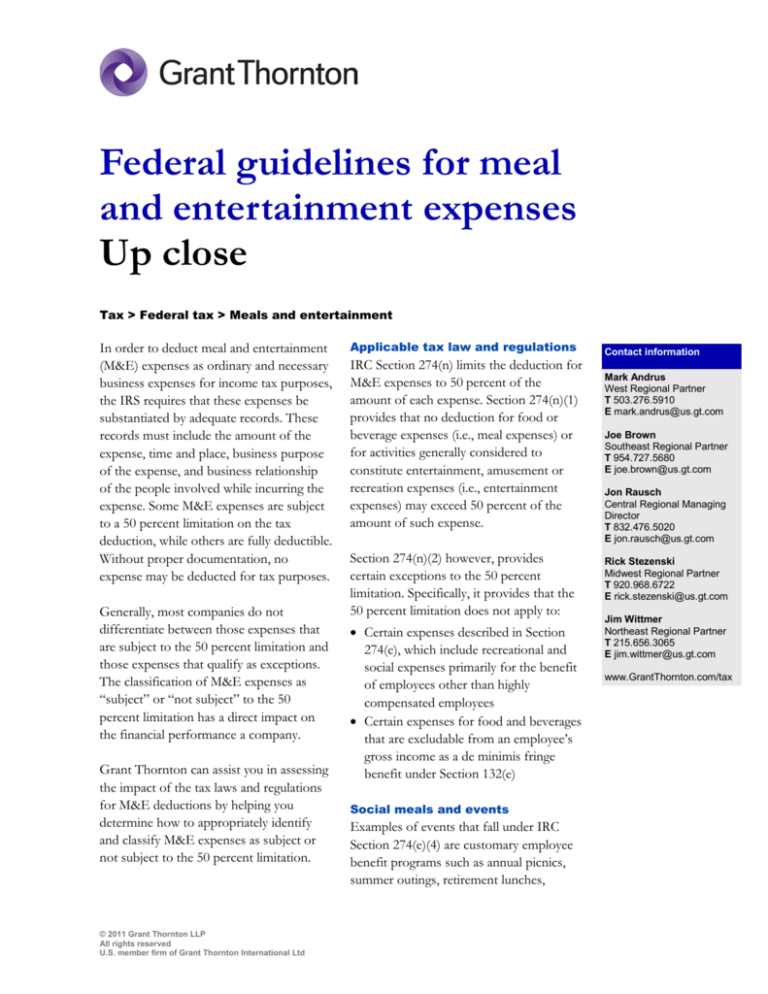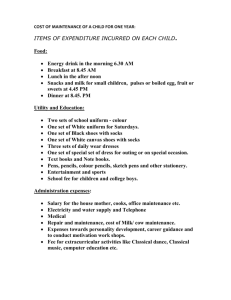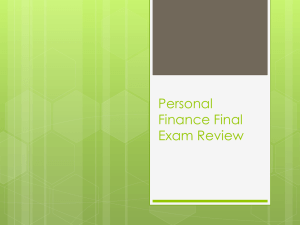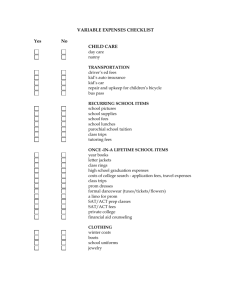
Federal guidelines for meal
and entertainment expenses
Up close
Tax > Federal tax > Meals and entertainment
In order to deduct meal and entertainment
(M&E) expenses as ordinary and necessary
business expenses for income tax purposes,
the IRS requires that these expenses be
substantiated by adequate records. These
records must include the amount of the
expense, time and place, business purpose
of the expense, and business relationship
of the people involved while incurring the
expense. Some M&E expenses are subject
to a 50 percent limitation on the tax
deduction, while others are fully deductible.
Without proper documentation, no
expense may be deducted for tax purposes.
Generally, most companies do not
differentiate between those expenses that
are subject to the 50 percent limitation and
those expenses that qualify as exceptions.
The classification of M&E expenses as
“subject” or “not subject” to the 50
percent limitation has a direct impact on
the financial performance a company.
Grant Thornton can assist you in assessing
the impact of the tax laws and regulations
for M&E deductions by helping you
determine how to appropriately identify
and classify M&E expenses as subject or
not subject to the 50 percent limitation.
© 2011 Grant Thornton LLP
All rights reserved
U.S. member firm of Grant Thornton International Ltd
Applicable tax law and regulations
IRC Section 274(n) limits the deduction for
M&E expenses to 50 percent of the
amount of each expense. Section 274(n)(1)
provides that no deduction for food or
beverage expenses (i.e., meal expenses) or
for activities generally considered to
constitute entertainment, amusement or
recreation expenses (i.e., entertainment
expenses) may exceed 50 percent of the
amount of such expense.
Section 274(n)(2) however, provides
certain exceptions to the 50 percent
limitation. Specifically, it provides that the
50 percent limitation does not apply to:
• Certain expenses described in Section
274(e), which include recreational and
social expenses primarily for the benefit
of employees other than highly
compensated employees
• Certain expenses for food and beverages
that are excludable from an employee’s
gross income as a de minimis fringe
benefit under Section 132(e)
Social meals and events
Examples of events that fall under IRC
Section 274(e)(4) are customary employee
benefit programs such as annual picnics,
summer outings, retirement lunches,
Contact information
Mark Andrus
West Regional Partner
T 503.276.5910
E mark.andrus@us.gt.com
Joe Brown
Southeast Regional Partner
T 954.727.5680
E joe.brown@us.gt.com
Jon Rausch
Central Regional Managing
Director
T 832.476.5020
E jon.rausch@us.gt.com
Rick Stezenski
Midwest Regional Partner
T 920.968.6722
E rick.stezenski@us.gt.com
Jim Wittmer
Northeast Regional Partner
T 215.656.3065
E jim.wittmer@us.gt.com
www.GrantThornton.com/tax
anniversary parties, awards dinners, as well
as such fringe benefits as a swimming pool,
baseball diamond, bowling alley or golf
course generally made available to
employees. The mere presence of a general
or specific business purpose should not
override a significant social purpose in
determining whether a particular meal or
entertainment expense qualifies as social
and is therefore 100 percent deductible.
Treas. Reg. Sec. 1.274-2(f) provides that
expenditures for activities made under
circumstances that discriminate in favor of
highly compensated employees will
generally not be considered made primarily
for the benefit of all employees. However,
this rule will not be deemed violated merely
because where there are large numbers of
employees, the activity is intended to
benefit only a limited number of such
employees at one time, provided the
activity does not discriminate in favor of
highly compensated employees.
Nominal food and beverages
Another example of the exception to the
limitation is expenses for food and
beverages that are excludable from an
employee’s gross income as a de minimis
fringe benefit under IRC Section 132(e).
IRC Section 132(e) defines the term “de
minimis fringe” as any property or service
the value of which is (after taking into
account the frequency with which similar
fringes are provided by the employer to
employees) so small as to make accounting
for it unreasonable or administratively
impracticable. Discriminatory meals and
entertainment activities cannot qualify
under the Section 132(e) exception;
therefore, they would be subject to the 50
percent deduction limitation. A slight
© 2011 Grant Thornton LLP
All rights reserved
U.S. member firm of Grant Thornton International Ltd
allowance is made for discriminatory social
meals, requiring the meals to be sufficiently
occasional in frequency to qualify under
the Section 132(e) de minimis exception.
A common example of a de minimis food
and beverage expense is buffet-style coffee
or breakfast served at group meetings. This
includes occasional refreshments
purchased by the employer and served to
various personnel or clients at meetings or
occasional large group meals served at the
office, conferences or seminars.
Treas. Reg. Sec. 1.132-6(b) provides some
additional guidance regarding the
“frequency” requirement for an expense to
qualify as de minimis under IRC Section
132(e). According to Treas. Reg. Sec.
1.132-6(b), frequency is generally
determined by reference to the frequency
with which the employer provides the
fringes to each individual employee. For
example, if an employer provides a free
meal in kind to one employee on a daily
basis, but not to any other employee, the
value of the meals is not de minimis with
respect to that one employee, even though
the meals are provided “infrequently” with
respect to the employer’s entire workforce.
However, where it would be difficult
administratively to determine frequency
with respect to individual employees, the
frequency with which similar fringes are
provided by the employer to its employees
is determined by reference to the frequency
with which the employer provides the
fringes to the workforce as a whole. Under
this rule, the frequency with which an
individual employee receives a particular
fringe benefit is not relevant to the
determination of whether such benefit is
de minimis with respect to that employee.
Nominal food and beverages
Group meals
Under Reg. Sec. 1.132-6(d), meals provided
to an employee will qualify as de minimis if
such benefit is reasonable and provided (1)
on an occasional basis, (2) because
overtime work necessitates an extension of
the employee’s normal work schedule and
(3) to enable the employee to work
overtime. This regulation specifically notes
that meals provided on the employer’s
premises which meet the above three
conditions are clearly de minimis.
Business meals (i.e., non-social meals)
where only employees are present may also
qualify for the IRC Section 132(e) de
minimis exception in certain situations. In
general, large group meals should qualify
for the exception because of their
occasional nature and the difficulty of
tracking attendance and whether a meal is
actually consumed at such functions. Small
group meals, so long as they are occasional
in nature and the amount of the expense is
not lavish or extravagant, may also qualify
as de minimis because of the infrequency
of occurrence and the difficulty of tracking
whether a meal has been consumed.
Reg. Sec. 1.132-6(e) provides examples of
de minimis fringe benefits, including:
occasional cocktail parties, group meals or
picnics for employees and their guests;
traditional birthday or business gifts of
property to employees or clients with a low
fair market value ($25 or less per person);
occasional theater or sporting event tickets;
coffee, doughnuts and soft drinks; and
flowers, fruit, books or similar property
provided to employees under special
circumstances (e.g., on account of illness,
outstanding performance or family crisis).
The regulation also provides examples of
fringe benefits that are not de minimis,
which include the following: season tickets
to sporting or theatrical events;
membership in a private country club or
athletic facility, regardless of frequency of
use; and use of an employer-owned or
leased facility (such as an apartment,
hunting lodge or boat) for a weekend.
Treas. Reg. Sec. 1.132-6(f) provides that
the nondiscrimination rules do not apply in
determining the amount of a fringe benefit,
even if the benefit is provided exclusively
to highly compensated employees.
© 2011 Grant Thornton LLP
All rights reserved
U.S. member firm of Grant Thornton International Ltd
Mentoring (coaching) programs
These rules can also be extended to
encompass mentoring or coaching
programs. The meal and especially the
entertainment activities under formal and
informal mentoring programs have
significant social or similar purposes that
qualify under the IRC Section 274(e)(4)
exception to the 50 percent deduction
limitation. In addition, such meals should
also qualify under the IRC Section 132(e)
de minimis exception because the
occurrence of mentoring meals is usually
relatively infrequent, i.e, such meals would
typically be occasional; therefore, they
could be treated as de minimis. Generally,
meals to discuss career objectives or annual
reviews should qualify as mentoring or
development lunches and should be
exempt from the 50 percent limitation.
Charitable events
Committee Report 99-514 states that
expenses for attendance at a sports event,
to the extent otherwise allowable as a
business deduction, are fully deductible if
the event meets certain criteria
requirements related to charitable
fundraising. In order for the costs to be
fully deductible as a business expense
under this rule, the event must be:
• organized for the primary purpose of
benefiting a tax-exempt charitable
organization (described in sec. 501(c)),
• contribute 100 percent of its net
proceeds to charity, and
• use volunteers for substantially all work
performed in carrying out the event.
This rule applies to the cost of a ticket
package, i.e., the amount paid both for
seating at the event and for related services
such as parking, use of entertainment areas,
contestant positions and meals furnished at
and as part of the event. The full cost of
the ticket package, not just the face amount
of the tickets, qualifies for the deduction.
Specifically subject to limitation
Certain expenses are specifically subject to
the 50 percent limitation. IRC Section
274(e)(5) states that food and beverages
served at business meetings of employees,
stockholders, agents or directors are
deductible. Section 274(e)(6) states that
expenses related to meetings of business
leagues, chambers of commerce, real estate
boards and boards of trade are deductible.
However, Section 274(n)(2)(A) does not
except these expenses from the 50 percent
limitation. Therefore, unless these expenses
otherwise qualify for an exception, such as
qualifying as de minimis fringe benefits
under Section 132(e), the 50 percent meal
and entertainment limitation will apply.
Also, meals incurred due to out-of-town
travel are not exempted.
© 2011 Grant Thornton LLP
All rights reserved
U.S. member firm of Grant Thornton International Ltd
M&E classification categories
Based on Grant Thornton’s interpretations
of the discussed applicable tax laws and
regulations, here are some examples of
how M&E expenses can fall within one of
two categories: “Subject to the Limitation”
or “Not Subject to the Limitation.”
Because the regulations do not always
clarify what specific expenses fall into these
categories, there is a possibility that a
different tax treatment should apply based
on different interpretations. Further,
policies and procedures should be
implemented in order to appropriately
identify the category under which the
expenses should fall.
Subject to the limitation
Based on our interpretation of the tax laws,
some expenses can fall into different
categories of exceptions. To the extent that
an M&E expense does not clearly fall
within one or more of the “exception”
groups explained below, that expense
should be subject to the limitation.
Not subject to the limitation
Social meals and events – limitation
exception: Social M&E expenses for
situations such as annual picnics or
summer outings should qualify under the
Section 274(e)(4) exception unless
attendance is primarily limited to highly
compensated employees. Activities whose
significant purpose is recreational, social or
some other similar purpose, such as
networking, should qualify under the
exception even if there is also a general or
specific business purpose. Discriminatory
social meals should be sufficiently
occasional in frequency, however, so as to
qualify under the IRC Section 132(e) de
minimis exception. Discriminatory
entertainment activities cannot qualify
under the IRC Section 132(e) exception
and would be subject to the 50 percent
deduction limitation.
Nominal food and beverages –
limitation exception: These amounts
occur in situations where the value of
meals or entertainment (after taking into
account frequency) is sufficiently small so
that accounting is unreasonable or
impractical (IRC Section 132(e)). Examples
of these expenses are buffet-style coffee,
water and pastries, as well as continental
breakfasts and buffet-style lunches (e.g.,
pizza). These types of items are considered
de minimis fringe benefits.
In addition, individual employee “working
meals,” if occasional and provided to
enable an employee to work an extension
of their normal schedule, should also
qualify for the exceptions under Reg. Sec.
1.132- 6(d)(2), e.g., meals provided on the
employer’s premises that are consumed
during the employee’s overtime period
satisfy the de minimis requirement.
Group meals – limitation exception:
Business meals (i.e., non-social meals)
where only employees are present, may
qualify for the IRC Section 132(e) de
minimis exception in certain situations. In
general, large group meals should qualify
© 2011 Grant Thornton LLP
All rights reserved
U.S. member firm of Grant Thornton International Ltd
for the exception because of their
occasional nature and the difficulty of
tracking attendance and whether a meal is
actually consumed at such functions. Small
group meals, so long as they are occasional
in nature and the amount of the expense is
not lavish or extravagant, may also qualify
as de minimis because of the infrequency
of their occurrence and the difficulty of
tracking whether a meal is actually
consumed at the function.
Mentoring (coaching) programs –
limitation exception: M&E activities
under formal or informal mentoring
programs have significant social or similar
purposes that qualify under the Section
274(e)(4) exception to the 50 percent
deduction limitation. While highly
compensated employees may benefit to a
greater extent, there is no intent to
discriminate. Any such discrimination is
purely a function of the nature of the
program (i.e., attendance at the activities
must be limited to encourage the
mentoring process; mentors will participate
in more of the activities than will those
being mentored).
Non-meal and entertainment expenses
– limitation exception: Because these
expenses are not incurred for food,
beverages or entertainment, they should
not be subject to the limitation described in
IRC Section 274(n)(1). For example, travel
and lodging, parking and mileage,
charitable contributions, advertising,
certain club dues, gifts up to $25 per
recipient, and seminars and training
expenses would all be considered nonM&E. These expenses should not fall
under any M&E category but rather should
be classified under the appropriate general
ledger accounts.
Conclusions and recommendations
IRC Section 274(n) limits the deduction for
M&E expenses to 50 percent of the
amount of each expense. However, there
are exceptions to the 50 percent limitation
provided by IRC Section 274(n)(2), such as
those expenses that are primarily
recreational or social in nature and are for
the benefit of employees, and de minimis
expenses for food and beverages that are
excludable from an employee’s gross
income under IRC Section 132(e).
Once the expenses have been classified as
subject or not subject to the 50 percent
limitation, then the expenses should be
posted to the appropriate general ledger
accounts. Using quality assurance measures
can help to ensure that expenses are
entered into the correct general ledger
accounts. Proper training and
implementation of M&E expense
guidelines can provide your company with
financial benefits.
Establishing a written M&E expense policy
is critical to cost-containment efforts. By
providing guidelines, an M&E policy can
help a company control expenses up front,
even before they are incurred.
You can also benefit from adopting an
automated accounting system for expenses,
if you do not already have one in place. An
automated system can help administrative
assistants spend a lower percentage of their
time handling paperwork generated by
volumes of transportation, hotel, meal and
entertainment receipts. In addition, an
automated system provides managers with
a reliable way to monitor whether or not
employees are adhering to corporate travel
and entertainment policies. A more
advanced system is an M&E application
© 2011 Grant Thornton LLP
All rights reserved
U.S. member firm of Grant Thornton International Ltd
hosted on a corporate intranet. With a
browser-equipped computer and a network
connection (no software required)
employees can file their expenses anytime,
anyplace. Technology allows you to map
these expenses directly to the appropriate
general ledger accounts ensuring that
expenses are appropriately classified.
Adopting written corporate policies, using
automated procedures for accounting for
employee expenditures and correctly
classifying M&E expenses will help your
company achieve financial success.
Summary of tax law interpretations
50 percent deductible meal and
entertainment expenses
Employee business-related events
• Meal expenses incurred outside the
office for employee or client-related
business matters in restaurants, hotels,
clubs, etc.
• Meal expenses incurred outside the
office, paid for by an employee and
reimbursed by the company, in the
course of educational, training, industry
or professional meetings
• Meal and entertainment recreational
expenses incurred primarily for the
benefit of highly compensated
employees
Employee out-of-town expenses
• Meal expenses which are not treated as
compensatory to the individual
Client business related-events
• Meal and entertainment expenses
incurred during client related meetings
100 percent deductible meal and
entertainment expenses
Employee business-related events
• Meal expenses incurred for occasional
large group in-office meetings
• Meal expenses incurred for occasional
large group in or out of office sales or
promotional seminars and meetings
• Meal expenses incurred for group
meetings while attending conferences,
seminars or training schools, paid for
directly by the company
• Meal expenses incurred for occasional
in-office working breakfasts, lunches
and dinners for the convenience of the
employer
• Buffet-style lunches, coffee, pastries,
snacks and continental breakfasts for
meetings served in or outside the office
• Meal expenses incurred for occasional
overtime work
Employee out-of-town expenses
• Meal and per diem expenses treated as
compensatory to the individual
Employee social events
• M&E expenses incurred for social or
recreational purposes such as holiday
parties, annual picnics, summer outings
or golf outings, primarily for the benefit
of employees other than highly
compensated employees. Meal expenses
(not including entertainment) incurred
for social or recreational purposes, even
if primarily for the benefit of highly
compensated employees.
© 2011 Grant Thornton LLP
All rights reserved
U.S. member firm of Grant Thornton International Ltd
Personnel recognition, mentoring or
other miscellaneous events
• M&E expenses incurred in connection
with a formal or informal employee
mentoring program
• Events held on a nondiscriminatory
recognizing individual or group
achievements such as retirement
lunches, employee anniversary parties,
awards dinners or project completion
celebrations
• M&E expenses associated with qualified
charitable events (including tickets and
refreshments) for employees and clients
• Tickets to sporting or cultural events
provided on a nondiscriminatory basis
to employees
• Food and beverage expenses of nominal
value (coffee or water service, candy
available to employees or customer)
Other items
• Out-of-town travel (transportation and
lodging) expenses are not subject to the
50 percent limitation and should be
assigned to the appropriate general
ledger travel and lodging accounts
• Generally club dues are not deductible
by the company unless they are included
in an employee’s W-2 or are paid to
public or professional service
organizations for business purposes.
Deductible dues are not subject to the
50 percent limitation on meal and
entertainment expenses
• Room charges and audio/visual
equipment for seminars, meetings and
social events are not subject to the 50
percent limitation
• Business gifts, including flowers to
customers or employees are 100 percent
deductible up to $25 per person
Examples of general M&E categories
Types of expenses
Fully
deductible
Subject to
50%
limitation
Examples
Employee business-related events
Business meetings
x
Lunch with coworker or client to
discuss business
Out-of-office meal while attending
training or professional meeting
x
Dinner paid for by employee and
reimbursed by employer after a
training seminar
Meal & entertainment for highly
compensated employees
x
Dinner/entertainment exclusively for
managers at country club for
recreational purposes
Meal for occasional office meeting for
the convenience of employer
x
Lunch ordered for quarterly
department meeting
Meal for occasional large group sales
or promotional meeting
x
Lunch for large group during sales
seminar hosted at a hotel or
conference center
Meal during conferences, seminars or
training schools
x
Lunch provided by employer at
training seminar hosted at a hotel or
conference center
Breakfast buffet hosted at
conference center during a regional
sales meeting
Occasional in-office working meals
x
Dinner ordered and paid for by
employee while working overtime;
meal reimbursed by employer
Nominal food and beverages
x
Bagels, doughnuts, coffee and juice
provided during meetings or social
gathering
Employee out-of-town expenses
x
Out-of-town travel not treated as
compensatory
Reimbursement to employee not
included in employee’s
compensation for meal expenses
incurred on business trip
Out-of-town travel treated as
compensatory
x
Meal expenses incurred during a
business trip included in employee’s
compensation
Travel and lodging
x
Mileage, airfare and hotel
accommodations for out-of-town
business meetings
Client business-related events
x
Client business meetings
Business dinner or golf outing to
develop client relationship
Employee social events
M&E expenses incurred for social or
recreational purposes primarily for the
benefit of employees other than highly
compensated employees
x
Retreats for employees to encourage
team building
Summer outing for employees and
family
Holiday party for employees and
family
Employee happy hour
Meal expenses (not including
entertainment), if for the benefit of
highly compensated employees
x
Celebratory dinner for corporate
executives to commemorate a
record-breaking year-end
© 2011 Grant Thornton LLP
All rights reserved
U.S. member firm of Grant Thornton International Ltd
Recognition, mentoring and miscellaneous expenses
Mentoring program
x
Mentoring lunch to discuss
employee’s performance
Nondiscriminatory events that
recognize individual or group
achievements
x
Retirement luncheon to celebrate
employee’s years of service to
company
Employee’s anniversary party with
the company
Reward dinners
Qualified charitable events for
employees and clients
x
Tickets for employees or clients to
professional golf tournament that
benefits charity
Meal tickets to a charitable dinner
Tickets to sporting or cultural events
provided to employees on a
nondiscriminatory basis
x
Tickets given to employees for
celebrity golf tournament as a reward
for services
Room charges and audio/visual
equipment for seminars, meetings,
social events, etc., for nonentertainment
x
Room charge for using the
clubhouse for professional seminar
Audio/visual equipment used during
a sales meeting
Club dues included in employees’
compensation
x
Country club dues are not deductible
if not reported as compensation to
employee
Social club dues are not deductible if
not reported as compensation to
employee
Dues for public or professional service
organization
x
Dues paid to legal or accounting
association, Kiwanis or Rotary Club
Note: These are general guidelines that may vary based upon individual facts and circumstances.
Tax professional standards statement
This document supports Grant Thornton LLP’s marketing of professional services and is
not written tax advice directed at the particular facts and circumstances of any person. If
you are interested in the subject of this document we encourage you to contact us or an
independent tax advisor to discuss the potential application to your particular situation.
Nothing herein shall be construed as imposing a limitation on any person from disclosing
the tax treatment or tax structure of any matter addressed herein. To the extent this
document may be considered to contain written tax advice, any written advice contained
in, forwarded with, or attached to this document is not intended by Grant Thornton to be
used, and cannot be used, by any person for the purpose of avoiding penalties that may be
imposed under the Internal Revenue Code.
© 2011 Grant Thornton LLP
All rights reserved
U.S. member firm of Grant Thornton International Ltd






